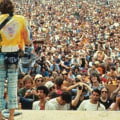Some social scientists theorize that popular culture is a tool that elites use to control people who are below them in society, but others emphasize that popular culture can also be used as a means of rebellion against the dominant culture. The German researcher Ronald Daus, who studies the impact of non-European cultures in North America, Asia and especially in Latin America, has made important contemporary contributions to understanding what popular culture means. In his successful textbook Cultural Theory and Popular Culture (now in its eighth edition), British media specialist John Storey offers six different definitions of popular culture. Many people sometimes view popular culture as something trivial and oversimplified in order to find consensus acceptance in the mainstream (or to attract attention from it).
The meaning of popular culture then began to merge with that of mass culture, consumer culture, image culture, media culture and culture created by manufacturers for mass consumption. Popular culture (also called mass culture and pop culture) is generally recognized by members of a society as a set of practices, beliefs and objects that are dominant or ubiquitous in a society at any given time. A postmodernist approach to popular culture would no longer recognize the distinction between high culture and popular culture. Popular culture (or pop culture) generally refers to the traditions and material culture of a particular society.
The term popular culture was coined in the middle of the 19th century and referred to the cultural traditions of the people, in contrast to the official culture of the state or of the ruling classes. Popular culture also encompasses the activities and feelings produced as a result of interaction with these dominant objects. Many people say that popular culture is a tool used by the highest-ranking people in a society and elites (who often control the media and popular culture media) use to control people who are below them in society. For example, certain trends in pop culture may originate in (or diverge from) a subculture, representing perspectives with which mainstream popular culture is only limited familiarity.
After the end of World War II, after the important cultural and social changes introduced by innovations in the media, the meaning of popular culture began to overlap with those of mass culture, media culture, culture of image, culture of consumption and culture of mass consumption.


